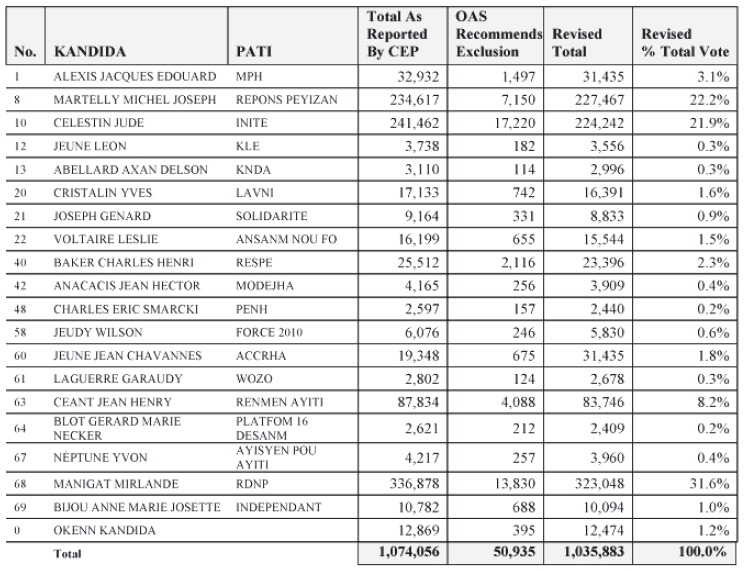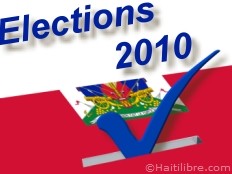|
||||||||||||||||||
| Téléchargez le décret et le calendrier électoral révisés, publiés au journal officiel |
|
|
Haïti - FLASH ÉLECTIONS : Pages clés du projet de rapport de l’OEA 12/01/2011 14:38:23
Selon le projet de rapport de l'Organisation des États Américains (OEA) chargé des vérifications des résultats préliminaires du premier tour, Jude Célestin serait exclus du second tour et le Candidat Michel Martelly prendrait la seconde place, accédant ainsi au second tour face à Mirlande Manigat. Lundi, devant des journaliste de la presse haïtienne, le Président René Préval affirmait ne pas avoir reçu le rapport des experts de l’OEA chargés des vérifications des résultats préliminaires contesté du premier tour des élections du 28 novembre. Lundi Kenneth Merten, l’ambassadeur américain à Port-au-Prince, a fait savoir que le rapport devait être envoyé aux autorités haïtiennes lundi en fin de journée ou mardi. Le lendemain dans une entrevue parue sur Euronews, René Préval précisait « Je n’ai pas encore reçu ce rapport et je l’attends. « J’ai demandé qu’il me soit remis après le 12 janvier après que l’on se soit recueillis sur nos morts » En attendant que ce rapport soit officiellement reçu et dévoilé, voici en avant première le contenu des pages clés, extraites du projet de rapport, concernant les conclusions et recommandations des experts de l’OEA. DRAFT ORGANIZATION OF AMERICAN STATES EXPERT VERIFICATION MISSION PRESIDENT ELECTION – FIRST ROUND 2010 FINAL REPORT The Expert Team verified 442 PVs from a national sample representing 71,423 votes and 454 PVs where it applied the criteria for disallowing PVs, which represent 118,478 votes. Additionally, the Expert Team retrieved 23 ballot boxes from all 10 of the BEDs, representing 2,162 votes. Team members travelled to the BEDs and brought the bags to be reviewed in the receiving center where electoral materials were returned on Election Day. In the presence of CEP authorities, they reviewed the contents of the bags and conducted a manual count of the ballots. The Expert Mission reviewed a total of 919 PVs or 8.2 percent of the total PVs processed by the CTV. This number represented 192,063 votes or 16.9 percent of the total votes processed by the CTV. Additionally, the user access logs for the CTV tabulation system were reviewed. A reference analysis was conducted to detect irregularities by implementing crossexaminations between the tabulation systems logs and the extract of the PV results by comparing the status of the PVs against result logs. Furthermore, the logs were review to verify that the first and second data intake operations were completed by different users. Finally, a review was conducted to verify that the operator quality control was undertaken by a user uninvolved in the data entry. The review concluded that all user control policies were followed. Finally, the Expert Team's mandate required it conduct interviews with electoral stakeholder to obtain their insights and opinions about the first round elections. In fulfilling this mandate, team members met with representatives of the presidential candidacies of Mr. Martelly, and of the Group of Twelve presidential candidates which is petitioning a group on the election results. Contact was made with Mrs. Manigat, but the proposed meeting with her representative never materialized. Team members also met with representatives of the following civil society organizations – Initiative de la Société Civile, (ISC), Réseau National de Droit de l'Homme, and the Conseil National d'Observation des Elections (CNO). These meeting also permitted the Expert Mission to offer information on its composition, its methodology and on some of its own insights. V. ELECTORAL VERIFICATION FINDINGS For the purposes of this Expert Mission, an "electoral irregularity" is defined as the purposeful or erroneous violation of official electoral procedures resulting in the disputed validity of voted ballots, electoral documents, or voter eligibility and, as a consequence, electoral results. Keeping in mind the relevant provisions of the Haitian Electoral Law, the Expert Mission noted the following kinds of irregularities in its verification process:
From the analysis of the information obtained from these sources, the Expert Mission identified the following tendencies.
In recommending a remedy to correct these irregularities, the Expert Mission identified four options for consideration:
The option to conduct a new national election was ruled out. As it pertains to the presidential election, which is the scope of the Expert Mission, the irregularities identified most profoundly affected the candidacies of the first, second and third place presidential candidates in the first round. The Expert Mission believes that a new election would involve more contests and candidacies than the evidence warranted. Furthermore, it would subject the Haitian people to a further lapse in constitutional governance, impose new campaign expenses, and diverting scarce resources both from the treasury of the Government of Haiti and international assistance would otherwise be directed into humanitarian relief, and reconstruction programming. The Expert Mission has ruled out the option of organizing a presidential election in selected areas was ruled out for similar reasons. While the variable costs associated with an election involving fewer voters would be, in principle, less than a nationwide one, the overhead costs of electoral administration would still be incurred, additional expenses would still be imposed on domestic and international stakeholders, and the lapse in constitutional governance would remain the same as in the case of a national election repoll. The Expert Mission does not consider a nationwide recount of presidential ballots as a feasible option. The Electoral Law of Haiti does not have explicit provisions to conduct a physical recount of ballots. According to Haitian legislation, the PVs serve as the final accounting of election results and the basis for any recalculation of the preliminary outcomes. The Expert Mission proceeded on the option of verifying the preliminary results by way of the visual verification of a large number of PVs in order to determine whether the preliminary results reflected the will of the people. In accordance with this provision of the law, the Expert Mission set four specific criteria to determine if a PV should be included: 1) the inclusion or absence of the required signatures of the polling officials on the Procès-Verbaux; 2) the inclusion or absence of the list of registered voters; 3) the presence or accuracy of the CIN numbers to identify those voters who cast their ballots at that particular polling station and if bona fide; 4) if a Procès-Verbal had been obviously altered to change the results of the elections, for instance adding a digit to a number to increase a vote total by a hundred or more, that PV was also excluded. Following the original "red flag" utilized by the ULC in the Tabulation Center, the Expert Mission reviewed those PVs where any single candidate received more than 150 votes or more. Because of the statistically significant patterns demonstrated in the national sample, it reviewed and evaluated all PVs with a participation of 50 percent and above and the previously mentioned candidate total. Every single one of the PVs with a participation rate that exceeded 100 percent was reviewed, irrespective of the candidate vote total. Any other PV that was found to not be in compliance with the above criteria, even if it didn't reach the thresholds for participation and candidate vote total, was also recommended to be disallowed and not included in the final vote tally. The table below shows the impact on vote totals for each presidential candidate when these criteria are applied campared with the officially reported election results from the CEP.  In compliance with its mandate, the Expert Mission offers to the CEP the following figures to quantify the impact of the recommendation to exclude 234 PVs from the vote tally. Should this recommendation be implemented., the position of the candidate in third place would change to second and the candidate now in second place would move to third. The final decision by the CEP should be followed by the statuory of contestation for a legal hearing of disputes over the CEP's decision so that a final result for the first can be certified. V. OTHER RECOMMENDATIONS In order to improve the integrity of polling and tabbulation in the second round of voting the CEP can consider intistuting the following policiy and administrative improvements. A. Polling Station Administration
B. Tabulation Center Administration The Expert Mission focused its efforts and activities in the Vote Tabulation Center (CTV, by its French acronym). Its two chief deficiencies concerned the lack of clear criteria for determining the validity of the Proces-Verbal and its complementary documentation. To this end, the Expert Mission provides the following recommendations.
Unit for Legal Control (ULC)
Conseil Electoral Provisiore
International Community
CONCLUSION The 2010 presidential election was the fourth conducted since the adoption of the Haitian constitution in 1987. While this Verification Mission has identified significant irregularities, which it believes influenced the outcome of the first round of elections, there are aspects of the electoral process to inspire confidence.
Electoral processes in all countries undergo reform and improvements. The Haitian electorate should regard the 2010 first round as another step in the democratic development of the country as it seeks to fulfill the constitutional principle of a "socially just, economically free, and politically independent Haitian nation." HL/ HaïtiLibre
|
|
|
Pourquoi HaïtiLibre ? |
Contactez-nous |
Charte de modération |
Privacy policy |
English
Copyright © 2010 - 2026 Haitilibre.com -n |





